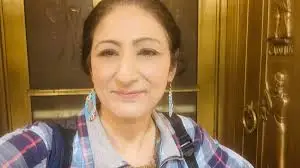Indian-origin British academic Nitasha Kaul claims her OCI status cancelled, says punishment for questioning Modi govt’s ‘anti-democratic policies’

London/New Delhi – May 2025:
British-Kashmiri scholar Nitasha Kaul says the Indian government cancelled her Overseas Citizenship of India (OCI) status because of her criticism of Prime Minister Narendra Modi’s administration. Kaul, who teaches at the University of Westminsteruni in London, described the decision as “vindictive” and called it a form of “transnational repression.”
She posted a portion of the official notice on social media. According to her, this move reflects an attempt to silence dissenting voices from the Indian diaspora. Kaul said her critical views on India’s treatment of minorities and democratic values led to this action.
History of Conflict with Authorities
Kaul has repeatedly raised concerns about India’s political direction. Her research focuses on democracy, nationalism, and human rights in South Asia. She has spoken against India’s Kashmir policy and warned about rising authoritarianism under the current government.
In February 2024, Karnataka’s state government invited her to speak at a conference on constitutional values. But immigration officials stopped her at Bengaluru airport. They denied her entry and sent her back to the UK the same day. No clear explanation was provided at the time.
Government’s Justification
The Ministry of Home Affairs accused Kaul of “anti-India activities.” Officials cited her articles, speeches, and social media posts as evidence. The cancellation notice claimed her actions harmed India’s reputation and threatened national unity.
Officials said OCI status is a special privilege and not an entitlement. They argued that Kaul misused that privilege by spreading misinformation and promoting hostility.
Kaul Pushes Back
Kaul rejected the government’s allegations. She said she only highlighted concerns about democratic decline and minority rights. In a public statement, she wrote, “This punishment isn’t about national security. It’s about silencing those who speak out.”
She explained that her work aims to protect democratic values. She also pointed out that criticizing government policies should not be treated as disloyalty. “My cultural and academic ties to India matter deeply to me,” she said. “Revoking my OCI is a way to sever those ties because I disagreed.”
Concerns in Academic Circles
Kaul’s case has alarmed global academic communities. Many fear that India is using legal tools to intimidate overseas scholars and journalists. Civil liberties groups have expressed concern about this trend.
Experts say similar actions have happened before. In 2019, India cancelled journalist Aatish Taseer’s OCI status after he wrote a critical article about Prime Minister Modi. In another case, a U.S. journalist lost his OCI after reporting on a powerful Indian businessman. These examples show a pattern of punitive measures against dissenting voices abroad.
What Is OCI and Why It Matters
OCI status allows people of Indian origin to visit and stay in India without a visa. It also gives them the right to work, study, or own property, though it doesn’t offer full citizenship. Many people in the diaspora rely on it to stay connected to their roots.
Revoking OCI over political views raises serious questions. Legal experts argue that using this status as a political tool may damage India’s democratic image. “When criticism becomes a reason to cancel rights, we need to ask what kind of democracy we are supporting,” said one legal scholar.
A Shrinking Space for Dissent?
Kaul’s experience reflects a deeper issue. Several observers believe that India is cracking down on free speech at home and abroad. They worry that denying entry, revoking visas, or cancelling OCI cards could become tools for silencing critics.
“This is not just about me,” Kaul said during a recent panel. “It’s about the right to speak freely without fear — no matter where you live.”
Despite the setback, Kaul plans to continue her academic work. She says she will not stop raising questions that matter. “I will keep writing, speaking, and researching because democracy depends on dialogue — not silence.”






